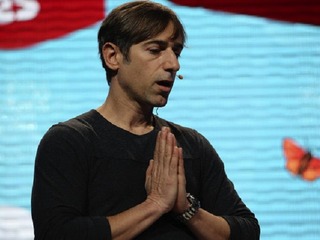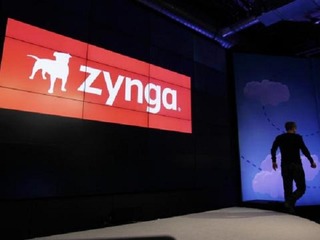
The good, the bad and the ugly of Zynga under Pincus
With Mark Pincus out as CEO, what will his legacy be?

With Mark Pincus stepping down as CEO of Zynga, the company will have a new man in charge for the first time since it was founded in 2007. This has been welcome news to many, including the company's investors.
Pincus, it must be said, does not have the best reputation as CEO. Doing research for this article turned by such phrases as "reign of terror."
Even the market seems have rallied around the idea of Pincus being at the helm: following the announcement on Monday, Zynga's stock rose 10% and continued to rise for the next two days.
So was Pincus that bad, or were his actions simply overblown? Let's look back at the good, the bad and the ugly of what life was like at Zynga under his leadership to see if his reputation is deserved:
The Good:
- Teaming with Facebook
Without a doubt the smartest move that Pincus ever made was signing a five-year agreement in 2010 to exclusively use Facebook credits. In return, Facebook helped promote Zynga.
The relationship was mutually benefitial, at least at first. By February 2012, 19% of Facebook’s revenue came from Zynga, with 12% coming drectly from Zynga and 7% coming from the revenue generated by ads on the games.
The numbers started to slip, though, as Zynga’s games became less popular, and the company became more dependant on Facebook for revenue, even as the amount of revenue Facebook was getting from Zynga was declining.
Finally, Zynga and Facebook filed documents with the SEC to loosen the relationship between the two companies. And, without Facebook, Zynga has struggled to distinguish itself from the pack.
But that relationship is really what put the company on the map and made it the largest social gaming company just a year or two ago.
- The man had an eye for talent
In May of 2011, Zynga acquired DNA Games, making founder and CEO Jonathan Lee General Manager at Zynga. The significance: not only was it another acqui-hire for the company, it was also the 14th startup bought by Zynga in 12 months, a staggering number.
It may seem like overkill, but this type of strategy was key to Zynga's early success: get to the top of the social game space by grabbing top games, and talent, wherever it could find them. Pincus, at least in the first few years, seemed to have a great eye for spotting smaller studios and talent that he could fold into his company to make it the biggest social game company on the net.
Other startups that Zynga bought in its early years included: Wonderland Software, which became Zynga Mobile U.K.; JamLegend, which had boasted two million users and 110 million plays; XPD; Challenge Games; Unoh Games; Conduit Labs; Dextrose AG; Bonfire Studios; Newtoy Inc.; Flock team; Area/Code; Floodgate Entertainment; and MarketZero.
Ultimately it would be an acquisition like this that would be one of the significant turning points for Zynga's fortunes, but it worked like gangbusters at the beginning.
- Zynga.org
A good part of anyone's legacy is ultimately going to be what he or she did with their success. If you make a billion dollars, as Pincus did at one point in Zynga's run, do you sit on it? Do you make a giant Scrooge McDuck money-pool and swim around in it? Or do you give back to those who are less fortunate and really need help?
Pincus chose the latter, setting up Zynga.org, a nonprofit organization that works with other game developers to leverage games to raise awareness and funds for nonprofits.
Started in 2009, Zynga.org has generated over $15 million for charitable organizations globally and launched more than 95 in-game social impact campaigns for a variety of international relief agencies, to which 3 million players had contributed.
For example, in January 2010, Zynga.org raised $1.5 million in five days for Haiti Earthquake Relief, with promotions running across some of the company's most popular games, including FarmVille, FishVille, Mafia Wars, and Zynga Poker.
In December 2012, Zynga.org partnered with Toys for Tots for its largest company-wide charitable campaign outside of disaster relief.
The campaign raised $745,000, to provide approximately 60,000 toys and books to children in need across the U.S.
Recently, Zynga.org entered into a new partnership with NewSchools Venture Fund in order to form a new accelerator focused on ed tech. Zynga.org also agreed to donate $1 million in funding for the accelerator's first year.
- He made Zynga into what it is
Credit where credit is due: some of his methods may have been less than pleasant, or ethical, (see below) but you really do need to give Pincus credit for taking Zynga and turning it into a powerhouse, and a company that raised $1 billion in its initial public offering. Management style, and personality aside, that was a real accomplishment, and it should not be forgotten.
The Bad:
Unfortunately, with all the good that Pincus did, there was also the bad. And some of it was really bad:
- Ripping off other games
Over the years, Zynga was involved in numerous lawsuits from other gaming companies, who accused Zynga of ripping off their designs. I recently spoke to a friend of mine in the gaming world about Zynga, and was the first thing that he said when I brought them up.
For example. Zynga was sued multiple times for its Mafia Wars game. The first time was by David Maestri, the creator of Mob Wars, in a case that was settled in September 2009 for about $9 million.
Zynga was then sued over the game again in 2010, this time by mobile game company Digital Chocolate for trademark infringement and unfair competition. That case was settled in 2011 for an undisclosed amount.
Similar accusations were made about Zynga games Cafe World, Zynga Bingo, Dream Heights, FarmVille and FrontierVille, among others.
Most recently the company was sued by Electronic Arts for alledgedly violating copyright infringement with its new game, called The Ville, which EA said was very similar to its own game, the Sims Social. The case was settled in February.
- Accusations of Insider trading
In July of last year, five law announced their intentions to investigate whether or not those Zynga insiders who sold off their stock a few months before it tanked were engaging in insider trading.
In April of 2012, when Zynga's shares traded around $12, executives and of the company and the company's board sold more than $500 million in stock. Zynga executives, including Pincus, CFO David Wehner, COO John Schappert, and general counsel Reginald Davis, as well as many heavy investors, such as Google, Venture Partners, Union Square Ventures, Reid Hoffman and others, all cashed out part of their stock, months before the stock cratered on the disappointing earnings report.
In total, 43 million shares were sold for $516 million. Pincus alone sold 16.5 million shares for $200 million.
No wonder investors were so happy to see him go!
- Pincus admits to scamming users
In a 2009 speech at a Startup@Berkeley mixer, Pincus admitted in no uncertain terms that that Zynga had spent its first two years scamming its users, including having them download apps that they could not remove to get credits for Zynga games.
"I knew that i wanted to control my destiny, so I knew I needed revenues, right, fucking, now. Like I needed revenues now. So I funded the company myself but I did every horrible thing in the book to, just to get revenues right away. I mean we gave our users poker chips if they downloaded this zwinky toolbar which was like, I dont know, I downloaded it once and couldn’t get rid of it. We did anything possible just to just get revenues so that we could grow and be a real business."
- Making employees give back stock
In lieu of raises, Pincus often gave shares of the company to his top talent as he built his online-game start-up. Fair enough, I guess: when the company went public, those employees would cash in.
Actually... no. Not if Pincus had anything to say about it.
In 2010, as the company began preparing for its IPO, Pincus all of the sudden decided that too many options had been given out. So he, and the company, demanded that those employees give back their share, or they would be fired.
Yes, this actually happened. Its a pretty good lesson in exactly how to not build any company loyalty, and to get people in your company, and those outside of it, to hate you.
- Giving himself "supershares"
Not all shares of a company are equal. Different classes of stock carry with them more levels of power and influence, and different numbers of votes for what direction the company is going to take itself in. And that is fine: those running the company should have more say, while individual investors are also given a voice.
Then there is what Mark Pincus decided to give himself right before the company's IPO: something called "supershares" which carry with them 70 votes apiece, compared to seven votes for other types of stock.
That meant that Pincus' shares would give him more influence than the 100 million shares that were offered to the public, who would be getting one vote apiece. In other words: Pincus made it abundantly clear that he did not care what the shareholders of his company thought about anything.
The ugly:
- Zynga hits the skids
For all of the shady practices that Pincus seems to have been involved with, I think they would have been forgiven if the company was able to maintain its success, especially after breaking up with Facebook.
But the company simply couldn't, and didn't. At least not with Pincus at the helm. And the results were ugly, to say the least.
The company's stock lost 70% of its value after its IPO, lost a lot of its top talent, was forced to lay off numerous employees and close numerous studios.
After the company recently layed off 18% of its global workforce, one former employee went on to do an Ask Me Anything on Reddit, and what he had to say was the ultimate indictment of the way Zynga was being run under Mark Pincus, blasting the company's "terrible" business strategy:
"Too many major decisions are quick reactions to sudden changes in the market. If some games jumps to the top of the Top Grossing charts then everyone need to drop everything and change to follow it. Which wastes time, makes for bad design and ultimately puts projects behind schedule," the employee wrote.
"It just means they're always late to the party, and whatever game they're trying to compete with has already faded away by the time their own version hits the market."
Conclusion
Despite what people may say, Mark Pincus was not all bad as CEO of the company he founded. He took a no-name company and turned it into a company that held the top game ranking on Facebook continuously for over two years. At one point, it held the top five spots.
The problem for Pincus, I believe, is that his strategy worked in the short term, but it was never going to last. The partnership with Facebook put Zynga out there and made it well known, but that relationship was eventually going to crumble, and Zynga never took the opportunity to distinguish itself beyond the platform. So once it did fall apart, Zynga became just another game company.
Pincus seems to be a man who is good at making the tough decisions that allow a company to rise to the top. He is not afraid to be the bad guy; he openly admits to do whatever it takes to make a profit. But what Zynga really needed was someone with a long-term vision to take over once it went public. Pincus' decision came a year and a half too late, and now investors have to be hoping that new leadership can restore Zynga's reputation in the coming years.
(Image source: https://commons.wikimedia.org)
Related Companies, Investors, and Entrepreneurs
Zynga
Startup/Business
Joined Vator on
Zynga is the largest social gaming company with 8.5 million daily users and 45 million monthly users. Zynga’s games are available on Facebook, MySpace, Bebo, Hi5, Friendster, Yahoo! and the iPhone, and include Texas Hold’Em Poker, Mafia Wars, YoVille, Vampires, Street Racing, Scramble and Word Twist. The company is funded by Kleiner Perkins Caufield & Byers, IVP, Union Square Ventures, Foundry Group, Avalon Ventures, Pilot Group, Reid Hoffman and Peter Thiel. Zynga is headquartered at the Chip Factory in San Francisco. For more information, please visit www.zynga.com.

Mark Pincus
Joined Vator on
Related News


Mark Pincus out as Zynga CEO, Don Mattrick in

Andy Tian, the head of Zynga China, is stepping down

LawsuitVille -Zynga investigated for insider trading



